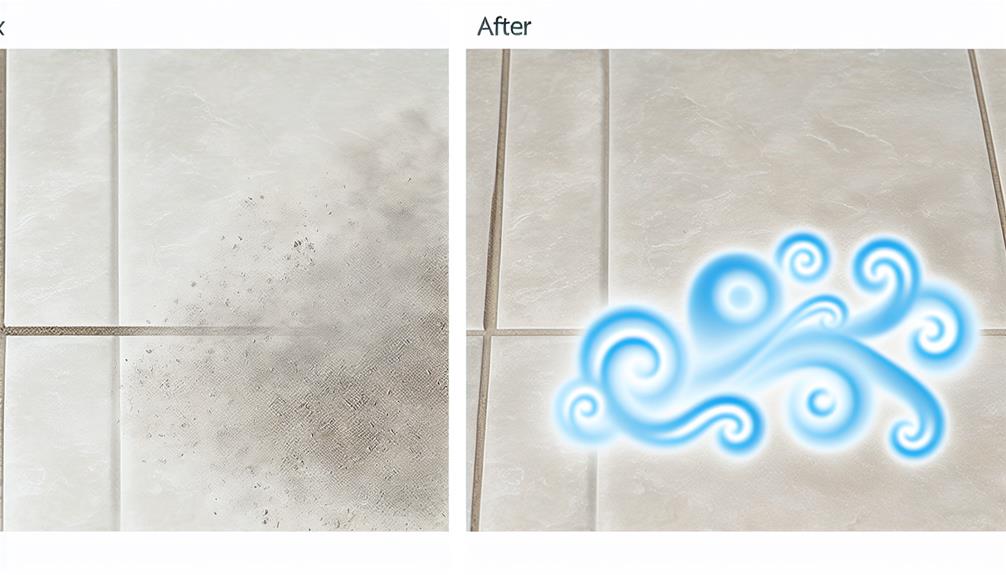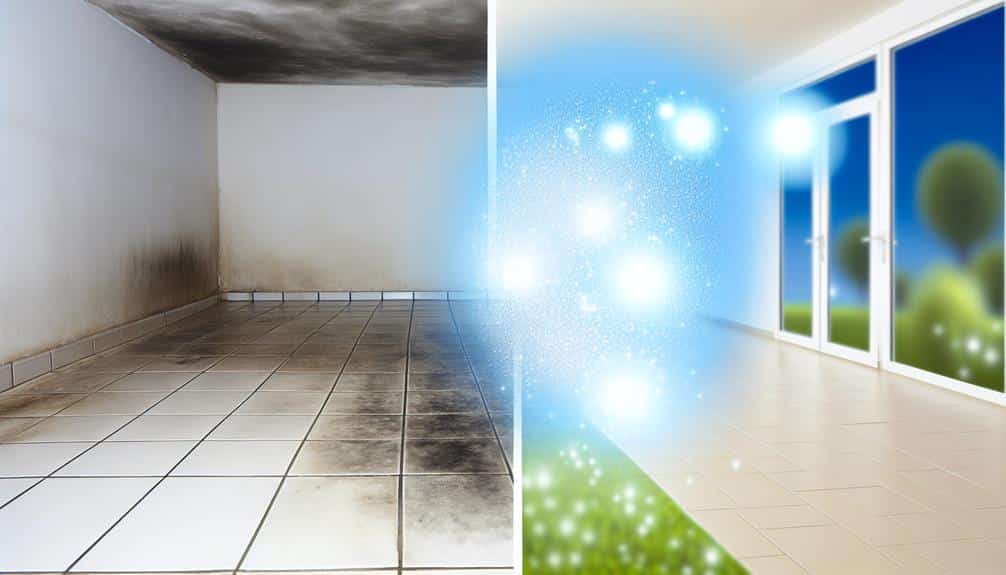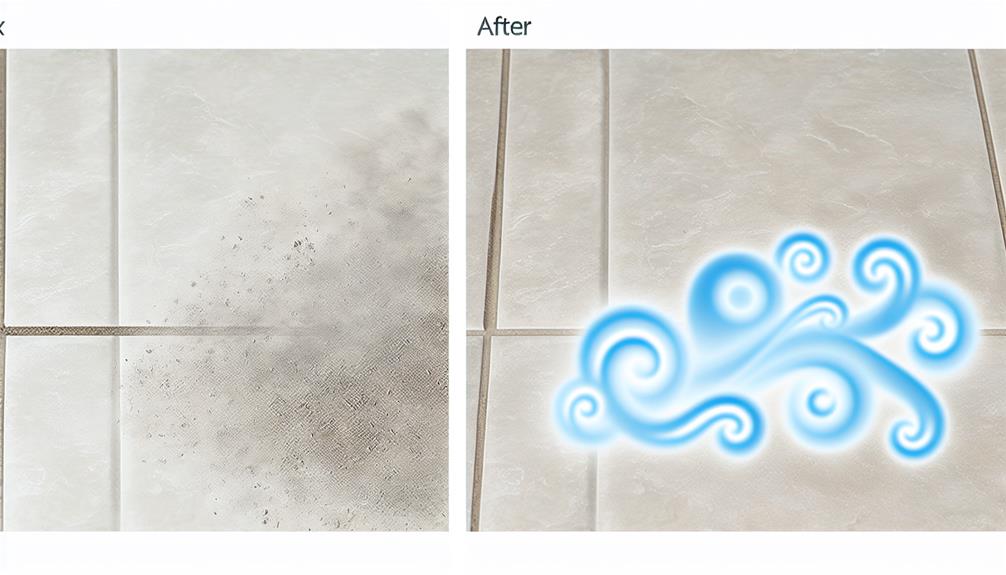Have you ever pondered the connection between the cleanliness of your tiles and grout and the quality of your home’s air? It’s not a typical consideration, is it? However, neglecting these areas can lead to an accumulation of allergens, dust, mold, and bacteria. All these elements can negatively impact your air quality. Regular cleaning of tile and grout provides an effective way to eliminate these pollutants, resulting in a healthier living environment. But how does this process work exactly? And what are the best practices for tile and grout maintenance? Let’s delve into this often overlooked aspect of home care.
Understanding Indoor Air Quality

You might not realize it, but the air you breathe in your home every day could be filled with pollutants. These airborne contaminants aren’t just annoying; they can have significant health effects. Dust mites, pet dander, mold spores, and even chemicals from everyday household products can all contribute to poor indoor air quality.
These pollutants can cause a range of health problems from minor irritations like coughing and eye irritation to more serious conditions such as respiratory diseases, heart disease or even cancer. You’re part of a community that values wellness and healthy living. Therefore understanding and combating these unseen threats lurking in your home is essential.
Breathe easier by regularly cleaning your tile and grout. This practice helps reduce the accumulation of allergens and pollutants thereby improving your home’s overall air quality.
Vacuuming and mopping your floors as well as wiping down tiled surfaces are good practices. Also, consider hiring a professional cleaning service for a deep clean.
Indoor air quality is more than just a buzzword. It’s a crucial part of your home environment and, ultimately, your health. By understanding and addressing air pollutants, you’re taking an important step towards creating a healthier, happier home.
The Hidden Dangers of Dirty Tiles
Over time, your tile and grout can become hidden danger zones in your home. You might think that a quick mop or wipe-down is enough to keep them clean. However, they can harbor harmful bacteria and mold which pose significant health risks. These hidden dangers may not always be visible but they are certainly there lurking in the pores and crevices of your tiles.
The problem with dirty tiles isn’t just their unsightly appearance; they’re potential breeding grounds for bacteria and other pathogens. If left unchecked, this can lead to issues such as asthma, allergies, skin irritations and other respiratory problems.
Moreover certain types of mold commonly found in damp environments like bathrooms can produce toxins that are hazardous to your health.
How Dirty Grout Affects Air Quality

In addition to the health risks posed by bacteria and mold the grime and dirt trapped in your grout lines can also compromise the air quality in your home. This is particularly important if you’re aiming to create a healthy welcoming environment for family or guests.
Grout due to its porous nature can act as a reservoir for airborne pollutants which can negatively impact the air you breathe.
Here’s how this works:
- Dirt and grime accumulate in the grout, which then becomes a breeding ground for bacteria and mold.
- These microorganisms release spores and toxins into the air, contributing to airborne pollutants in your home.
- Without regular grout maintenance, this problem can escalate leading to poor indoor air quality and potential health risks.
Understanding the link between dirty grout and air quality is the first step in creating a healthier home environment. Remember it isn’t just about surface appearance; it’s also about the unseen impact on your home’s air quality. Therefore don’t overlook grout maintenance—it plays an essential role in your home’s overall health.
Benefits of Regular Tile Cleaning
Maintaining a routine of regular tile cleaning offers numerous benefits that go beyond mere aesthetics. Let’s start with health benefits. When you maintain clean tiles you’re reducing the amount of dust mold and bacteria in your home. These elements can trigger allergies asthma and other respiratory issues. So by regularly cleaning your tiles you’re creating a healthier living environment for yourself and your loved ones.
Now let’s talk about cost savings. Regular tile cleaning helps prolong the lifespan of your tiles. Over time dirt and grime can cause tiles to degrade or discolor. By keeping them clean you’re preventing premature wear and tear thereby saving on potential replacement costs. Plus you’re also maintaining your home’s value which can be a big advantage if you ever decide to sell.
In essence regular tile cleaning isn’t just about having a sparkling clean home; it’s about fostering a healthier living space while being financially savvy at the same time. So don’t underestimate the power of clean tiles—it’s a simple task with far-reaching benefits.
In the next section we’ll explore the best practices for cleaning grout.
Best Practices for Cleaning Grout

Regularly cleaning your grout can greatly enhance the overall appearance of your tiles while also extending their lifespan. But it’s not just about aesthetics or durability; it’s also about your health. Clean grout means fewer allergy triggers and improved indoor air quality.
Now it’s time to take action. Here are some best practices for cleaning grout:
- Use a grout-specific cleaner: Opt for a cleaner specifically designed for grout. These solutions penetrate the porous surface of the grout and remove embedded dirt and grime.
- Adopt effective scrubbing techniques: Scrubbing your grout with a stiff-bristle brush can be quite effective. Remember to scrub in a circular motion to reach all the dirt.
- Apply sealants to your grouts: After cleaning consider applying a sealant to your grouts. This creates a barrier that helps prevent future staining and makes cleaning easier.
Maintaining Air Quality With Clean Floors
Maintaining clean floors isn’t just good for aesthetics; it’s an essential step in preserving indoor air quality. You might not realize it but clean flooring equals healthy air. When your floors are clean there’s less dust pollen and other allergens that can be kicked up into the air you breathe.
Regular floor maintenance is vital for air quality. It’s not just about sweeping and mopping though. The grout between your tiles can accumulate dirt and grime and if it’s not cleaned properly it can contribute to poor air quality in your home.
A deep clean can remove these pollutants preventing them from tainting your indoor air.
Consider hiring a professional for a thorough tile and grout cleaning. They have the expertise and equipment to get your floors genuinely clean not just surface-level clean. This isn’t just about making your floors look good—it’s about creating a healthier living space for you.
Conclusion
So keeping your tiles and grout clean isn’t just about aesthetics; it’s a vital step in maintaining healthy indoor air quality. Regular cleaning eliminates allergens dust mold and bacteria giving you cleaner air to breathe. By adopting good cleaning practices you’re not only sprucing up your home but also safeguarding your well-being. Don’t underestimate the power of clean floors—they’re your secret weapon for a healthier living environment.
If you’re interested in learning more about how professional tile and grout cleaning can benefit you I invite you to visit Hydra Clean of Hattiesburg MS at myhydraclean.com or give us a call at (601) 336-2411. We’re here to help create a cleaner healthier home for you!

